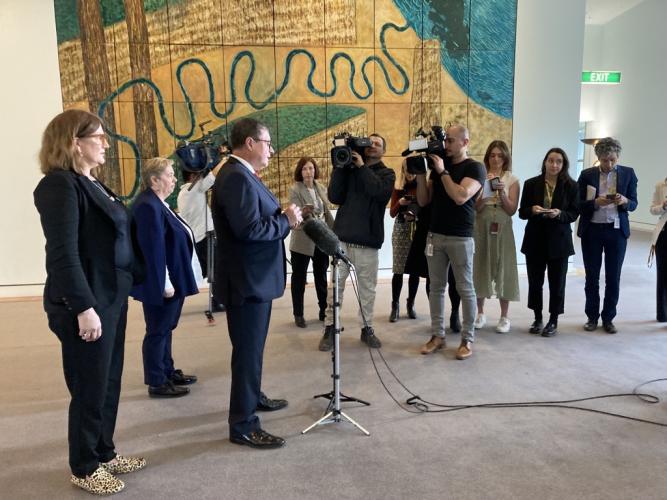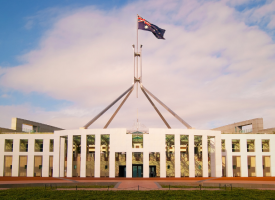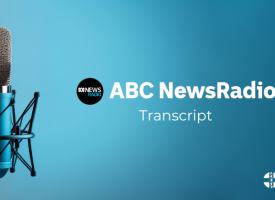Press conference on 60-day dispensing disallowance motion
Joint Press Conference Transcript: AMA President, Professor Stephen Robson, Consumers Health Forum CEO Elizabeth Deveny and Royal Australian College of General Practitioners President Professor Nicole Higgins - Mural Hall, Australian Parliament House, 10am AEST.

Subject: Sixty-day dispensing disallowance motion, payroll tax
STEVE ROBSON: I’m Steve Robson, Federal President of the Australian Medical Association. Doctors like me have an obligation to act in the best interests of our patients. The Coalition yesterday showed they do not feel the same way. The Senate today has the opportunity to do the right thing for all Australians, and we hope that they’ll grasp that opportunity. Affordable medication should be available to every single Australian. It’s that simple. And we want to make sure that we don’t miss this opportunity again. The Coalition had the opportunity when they were in government to bring in these cost of living improvements for patients and for all Australians. They killed it off at the time. They're trying to kill it off again. This can't happen. It's time that people in the Senate overall took the opportunity to make medicines affordable at a time of a cost of living crisis. I’d like to hand over to Elizabeth Deveny from the Consumers Health Forum.
ELIZABETH DEVENY: Thank you. My name is Elizabeth Deveny. I’m the CEO of the Consumers Health Forum. We’re an independent national peak for health consumers. We’ve been advocating, along with many other organisations, such as those that represent people who have arthritis, asthma, and high blood pressure, for a very long time for this change. When we hear from consumers, they’re very supportive, they want their medicines to be cheaper for them, they want to visit their GP and their pharmacy less often, because there are the obvious financial costs and lots of other costs in the comings and goings that happen. Indeed, we’ve not had a single health consumer come to us with any concerns about this measure. They just say ‘bring it on’. So pharmacists are of course a very important part of the healthcare community. Running a pharmacy is the business of pharmacists. For us, as a health consumer peak body, our job is the health of Australians and to advocate for the things that they want. And we’re calling on Senators to make the health of Australians their business too and do the right thing today in the Chamber. And I'll pass it on to Nicole Higgins.
NICOLE HIGGINS: Hello. Nicole Higgins, President of the Royal Australian College of General Practitioners. So we're calling on the Senate to put patients before profit. Bigger pack sizes, longer prescriptions will make medications cheaper and easier for patients and it will free up GP appointments. As a GP from rural Australia, we work very closely with our pharmacy colleagues, but our rural patients deserve help, and like everybody, the cost of living pressures are biting and they deserve medications that they can afford. As Steve said, and Elizabeth, this has been five years in the making. This was recommended to government by the experts over five years ago. Four years ago, the Coalition folded under pressure from the pharmacy owners. We need to put our patients first. We need to provide relief and we need to make sure that the Senate does the best for Australia today in 60-day dispensing. So thank you.
QUESTION: Other than the Greens and Labor, have any of you got assurances from any other Senators that they’re going to vote this disallowance down?
NICOLE HIGGINS: So we are waiting on the crossbench to make their decision and we will find out what will happen shortly.
QUESTION: You were calling for a long time for this not to be held up in the Senate because it was so important. The Opposition has been [indistinct]. What was your response to that?
NICOLE HIGGINS: We're deeply disappointed by the disallowance motion. As I said, this has been something that has been in train for the last five years. It has previously been knocked back by the previous Liberal government and once again they've succumbed to pressure. The Pharmacy Guild is one of our biggest political donors in Australia. They expect a return on investment and they are trading off our patients for profits.
QUESTION: So you raise that point. There's about 3000 pharmacy owners. They are one of the most powerful lobby groups in Australia. They're also one of the most protected industries. You can't own a pharmacy unless you're a pharmacist. You can't open a new one within 1.5km of an existing one. Is it time to let the market operate and allow supermarkets, scrap the location rules, and let some competition into this sector so that the taxpayer and consumers can get a better deal where medicine is concerned?
NICOLE HIGGINS: So our position is this is about patients today and the negotiations between the Pharmacy Guild and the government is between them. However, we also have the eighth community pharmacy agreement coming forward. And if there's any concerns around today's decision, that could be rectified as we go through those next negotiations. Steve.
QUESTION: The AMA's complained that 15 government inquiries have called for more competition in this sector. Steve, do you think that something needs to happen here?
STEVE ROBSON: I absolutely think something needs to happen today, and that is the crossbench Senators need to do the right thing for Australians at a time of a cost-of-living crisis. We can't go along with what the Coalition want to do and wreck this for Australian patients.
QUESTION: Can you clear up the issue of the repeats on these 60-day scripts? Will people be required to go back to their GPs because they're getting fewer repeats than they would in a 30-day script?
NICOLE HIGGINS: Yeah. Happy to answer. This doesn't change anything. This does not change how we interact with our patients. This will always be at the doctor's discretion. But what this does is that it allows people not to have to go back every month. They will get two months at a time and up to 12 months’ supply. Now, what patients, as you know at the moment as pack sizes are different, the average visit per patient that they have to make to the pharmacy is 18 times per year. And that source of that is through- from the Westpac Report from the Pharmacy Guild. So 18 times a year, let's try and make that access easier and make sure that we free up those GP visits as well.
QUESTION: So they'll be making fewer visits to the GP?
NICOLE HIGGINS: They will still have their regular visits with their GP for their complex chronic disease or prescriptions. But yes, it's going to free up those appointments that are just for scripts. Those- we want people to go to the GP when they need to, not just for a script or things that we can actually do in other ways. So this makes things much more efficient.
STEVE ROBSON: Now, this is entirely about patients and about affordability of medicines. I'm sure you've got some questions for Elizabeth from the consumer side because that's actually what this is all about.
QUESTION: How bad would it be if patients don't get their savings on 1 September? How big an impact on people’s budgets?
ELIZABETH DEVENY: I think it’ll be really significant. It’ll be significant because the cost-of-living pressures are huge and for those people- we hear stories from people who travel hundreds of kilometres to pharmacies; we’re every day hearing stories from people who are not getting their scripts filled because they can’t afford one. Parents who make the decision not to get their own scripts filled, they get them done for their children perhaps; people sharing medication where they shouldn’t; people making the decision not even to see their GP because they know they can’t afford what comes next. I think people will be very disheartened to hear that their government hasn’t understood, and Senators haven’t understood, that they really need this now and people have already been ringing their GPs saying, when can I come to do this? How will they feel if they find out the answer is never?
QUESTION: Professor Robson, can I ask you about an issue in South Australia? There's been a doctor that's been working there unregistered in the Port Augusta Hospital for six days. Are you across that issue or not?
STEVE ROBSON: Yeah, look, I haven't heard of that. I can certainly get back to you. But of course, it's critically important that any health worker in the country who provides patient care must go through all the processes to make sure that they're registered and safe to provide that care.
QUESTION: A review has found, though, that this doctor intentionally- repeatedly lied to staff about the progress of his registration, and two reviews were quite scathing of SA Health. How concerned does that make you, and I guess, do you think that that could be an issue that's happening elsewhere in the South Australian health system or even more broadly?
STEVE ROBSON: It's an incredibly important issue and everybody hears a story will be concerned about standards, but I don't- I'm not across it. I'd love to answer the question. I'm happy to find out more and get back to you. No problem.
QUESTION: If I could ask a quick question regarding the ACT. Today, the AMA and the RACGP have joined forces criticising the ACT government for refusing to rule out a payroll tax increase that…
[Audio skip]
STEVE ROBSON: The commonwealth government has put together a package to increase funding for patients and GP consultations. Having that money that’s put in skimmed off and having the state or territory governments plotting to take it back through payroll tax is an outrage.
QUESTION: And is it disappointing that the ACT government would do this at a time when clinics are really struggling to operate?
STEVE ROBSON: I’m disappointed that any government anywhere is making affordability and access to healthcare worse.
QUESTION: So I might just try and- on that issue, just try and ask you something a bit more broadly. You know, regional hospitals are obviously facing staff shortages, you know, trying to attract doctors and that sort of thing. Does that make them more susceptible to having issues like this unregistered doctor?
STEVE ROBSON: Look, the health workforce is critically important. And we know that in rural, regional, and remote areas of Australia, the crisis is particularly acute. Anything we can do to make sure that safe, affordable, accessible healthcare is available to all those Australians who live outside of our cities should be high priority.
NICOLE HIGGINS: I just want to step in around payroll tax. So, the federal government’s Medicare reforms will be completely undermined by state payroll tax. So this is a grab by the states for federal funds. As a GP, payroll tax will have to be handed over- passed onto our patients. The Queensland Government has put that at $100 million per year that our patients are now going to have to stump up at a time of cost of living pressures. The ACT Government, I’m very grateful for, have actually said that they won't be applying that retrospectively, and that's very important as far as planning. But there is still work to do. But we also know from another jurisdiction that a practice that has 20,000 patients has been hit by a payroll tax bill of $450,000. They are in an area post-disaster. They've been given 21 days to pay. So, unfortunately, this practice is very much looking at closing. So there's unintended consequences and it's probably the biggest risk that we have to Medicare and patients at the moment.
QUESTION: So just to confirm, this is happening in other states and territories?
NICOLE HIGGINS: So we've managed Queensland, South Australia, WA, and now ACT. We've been working with AMA and RACGP to get concessions to allow general practice to adjust and to make changes. GPs already pay payroll tax on our staff, on our doctors in training, on our nurses, and this is a tax on Medicare. It’s Victoria and New South Wales who are not coming to the table and who are going to completely undermine our federal reforms, such as to bring in bulk billing incentives. So for our vulnerable patients, it’s going to be a huge mountain.
STEVE ROBSON: You’re all legends. Thanks.
NICOLE HIGGINS: Thank you.
ELIZABETH DEVENY: Thank you.
* * End * *



